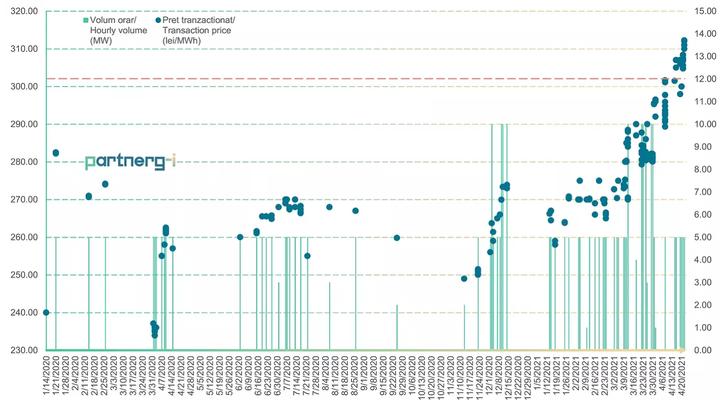The end of April brings transactions at record prices for electricity. In an article posted on the partnerg-i blog, Theodor Livinschi, the founder of the consultancy firm, notes that futures prices for electricity are set at high levels. Furthermore, the expert suggests that the pressures for renegotiation will intensify, including the prices and conditions of contracts already signed at a fixed price.
“No future year has been more expensive than 2022. Don’t underestimate the second semester of this year either!” Theodor Livinschi starts. “The year 2022 (A+1, at present) was traded at 312,25 lei/MWh on the wholesale market. The previous record of the transaction price for A+1 was set for the delivery year 2020, on 20.09.2019, when the price of the 10 MW traded was 302,29 lei/MWh. The record has already been exceeded by 3,3% (by almost 10 lei/MWh, in 24 transactions totaling 103 MWh in just 5 days) and we still have 8 months before the current A+1 starts.”
As for the second semester of 2021, on Friday, April 23, offers were made at 345 lei/MWh. By comparison, “your current contract price is very competitive”, notes Theodor Livinschi. This price must also prove “truly invariable”, he warns. “Some of our partners have been contacted to increase their contracted prices”, continues Livinschi. He considers that there is no time for a delay before “assessing alternative contracting methods (products, periods, proportions, etc.) or understanding not only the price evolution but your actual future or already contracted costs. Expertise in the full security of contracts can offer some form of protection or, if contracts have already been signed, there are levers for good negotiation in the future.
partnerg-i will organize on 11th of May a free workshop dedicated exclusively to the representatives of the industrial companies with power and/or natural gas consumption.
WORKSHOP (in RO) How do you address market risks that can interfere with energy purchasing?
partnerg-i presents itself as a unique company in the local market, which aims to support industrial consumers in the acquisition and management of services to provide the two commodities.
